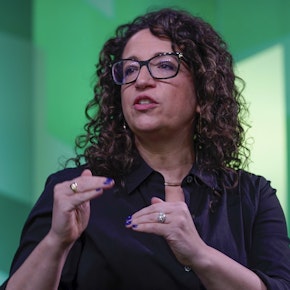Explore
Search results

The United States and Germany have much in common: advanced industrial economies, high living standards, first-class universities, and leading companies. They also share the same pressures from globalization — trade competition, technological change, movement of people and ideas — around which to innovate and adapt. But the data makes it clear that Germany has better maint...

As technology advances into schools, and children grow up immersed in gadgets, apps, and social media, concerns about the implications of a high-tech environment on child development are becoming more urgent. With the pervasiveness of attention-seeking and addictive electronic devices, how can we maximize the benefits and convenience of technology while mitigating potentia...

Every day, young people connect with peers around the world in collaborative, technology-enabled learning experiences where they learn about and with each other. This session explores how facilitated technology can empower young people from different backgrounds to share their personal narratives and explore their differences for a deeper connection and understanding. The...

Within our lifetimes, AI will, by design, begin to behave unpredictably, thinking and acting in ways which defy human logic. Big tech companies may be inadvertently building and enabling vast arrays of intelligent systems that don't share our motivations, desires, or hopes for the future of humanity. Is it too late to change course and realize a human-centered future for a...

Virtual exchange is online education that brings young people together in virtual classrooms with their peers around the world. These low-cost programs are uniquely capable of reaching those who do not have access to international education. Virtual exchange combines technology and curriculum to give young people cross-cultural competency and 21st century skills—language,...

At a moment when decades of academic achievement have been lost, can we amplify the benefits of A.I. equally across society, or will we allow a deeper digital divide to leave out even more students? Khan Academy founder and CEO Sal Khan talks about the potential for this nascent technology to transform education, activating and engaging an entire generation to create chang...

If young adults need a college education so badly, why are recent college grads so disproportionately unemployed? Experts tell us that two-thirds of jobs in the US by 2020 will require post-secondary credentials of some sort. Ironically, the pace of change is such that identifying the jobs that will come available in five years is hard to predict, creating questions ab...

US higher education is challenged by several dynamic forces: Americans are less likely than in the past to attend college, but those who do are more diverse. Costs and debt are rising — as is mistrust of higher education. And the skills needed to succeed in the workforce are evolving rapidly as technology advances. Can the nation’s 4,000 colleges and universities succeed b...

Is America turning its back on the humanities? The evidence seems real when we see declining enrollments in the studies of arts, history, literature, language, and philosophy at colleges and universities across the country. Declining enrollments preface limited budgets for broad areas of inquiry as the promise of STEM curricula woos students to jobs and career paths. I...

